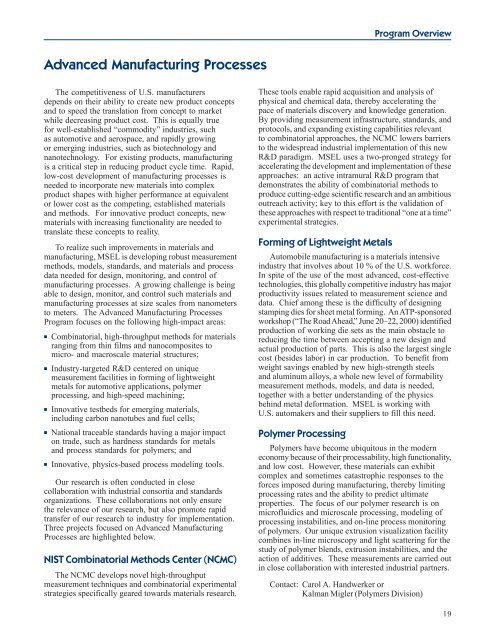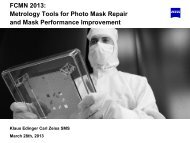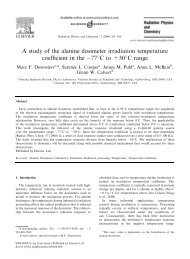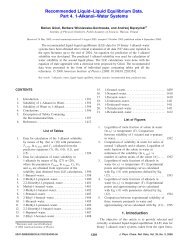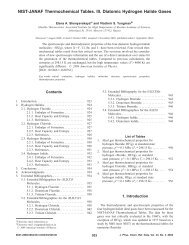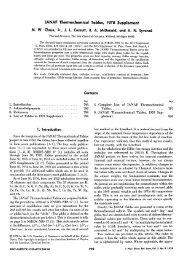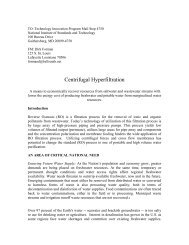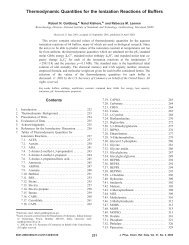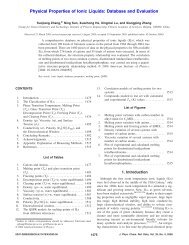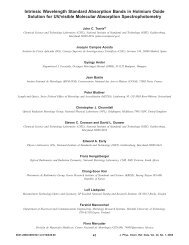Materials Science and Engineering Laboratory FY 2004 ... - NIST
Materials Science and Engineering Laboratory FY 2004 ... - NIST
Materials Science and Engineering Laboratory FY 2004 ... - NIST
You also want an ePaper? Increase the reach of your titles
YUMPU automatically turns print PDFs into web optimized ePapers that Google loves.
Advanced Manufacturing Processes<br />
The competitiveness of U.S. manufacturers<br />
depends on their ability to create new product concepts<br />
<strong>and</strong> to speed the translation from concept to market<br />
while decreasing product cost. This is equally true<br />
for well-established “commodity” industries, such<br />
as automotive <strong>and</strong> aerospace, <strong>and</strong> rapidly growing<br />
or emerging industries, such as biotechnology <strong>and</strong><br />
nanotechnology. For existing products, manufacturing<br />
is a critical step in reducing product cycle time. Rapid,<br />
low-cost development of manufacturing processes is<br />
needed to incorporate new materials into complex<br />
product shapes with higher performance at equivalent<br />
or lower cost as the competing, established materials<br />
<strong>and</strong> methods. For innovative product concepts, new<br />
materials with increasing functionality are needed to<br />
translate these concepts to reality.<br />
To realize such improvements in materials <strong>and</strong><br />
manufacturing, MSEL is developing robust measurement<br />
methods, models, st<strong>and</strong>ards, <strong>and</strong> materials <strong>and</strong> process<br />
data needed for design, monitoring, <strong>and</strong> control of<br />
manufacturing processes. A growing challenge is being<br />
able to design, monitor, <strong>and</strong> control such materials <strong>and</strong><br />
manufacturing processes at size scales from nanometers<br />
to meters. The Advanced Manufacturing Processes<br />
Program focuses on the following high-impact areas:<br />
■ Combinatorial, high-throughput methods for materials<br />
ranging from thin films <strong>and</strong> nanocomposites to<br />
micro- <strong>and</strong> macroscale material structures;<br />
■ Industry-targeted R&D centered on unique<br />
measurement facilities in forming of lightweight<br />
metals for automotive applications, polymer<br />
processing, <strong>and</strong> high-speed machining;<br />
■ Innovative testbeds for emerging materials,<br />
including carbon nanotubes <strong>and</strong> fuel cells;<br />
■ National traceable st<strong>and</strong>ards having a major impact<br />
on trade, such as hardness st<strong>and</strong>ards for metals<br />
<strong>and</strong> process st<strong>and</strong>ards for polymers; <strong>and</strong><br />
■ Innovative, physics-based process modeling tools.<br />
Our research is often conducted in close<br />
collaboration with industrial consortia <strong>and</strong> st<strong>and</strong>ards<br />
organizations. These collaborations not only ensure<br />
the relevance of our research, but also promote rapid<br />
transfer of our research to industry for implementation.<br />
Three projects focused on Advanced Manufacturing<br />
Processes are highlighted below.<br />
<strong>NIST</strong> Combinatorial Methods Center (NCMC)<br />
The NCMC develops novel high-throughput<br />
measurement techniques <strong>and</strong> combinatorial experimental<br />
strategies specifically geared towards materials research.<br />
Program Overview<br />
These tools enable rapid acquisition <strong>and</strong> analysis of<br />
physical <strong>and</strong> chemical data, thereby accelerating the<br />
pace of materials discovery <strong>and</strong> knowledge generation.<br />
By providing measurement infrastructure, st<strong>and</strong>ards, <strong>and</strong><br />
protocols, <strong>and</strong> exp<strong>and</strong>ing existing capabilities relevant<br />
to combinatorial approaches, the NCMC lowers barriers<br />
to the widespread industrial implementation of this new<br />
R&D paradigm. MSEL uses a two-pronged strategy for<br />
accelerating the development <strong>and</strong> implementation of these<br />
approaches: an active intramural R&D program that<br />
demonstrates the ability of combinatorial methods to<br />
produce cutting-edge scientific research <strong>and</strong> an ambitious<br />
outreach activity; key to this effort is the validation of<br />
these approaches with respect to traditional “one at a time”<br />
experimental strategies.<br />
Forming of Lightweight Metals<br />
Automobile manufacturing is a materials intensive<br />
industry that involves about 10 % of the U.S. workforce.<br />
In spite of the use of the most advanced, cost-effective<br />
technologies, this globally competitive industry has major<br />
productivity issues related to measurement science <strong>and</strong><br />
data. Chief among these is the difficulty of designing<br />
stamping dies for sheet metal forming. An ATP-sponsored<br />
workshop (“The Road Ahead,” June 20–22, 2000) identified<br />
production of working die sets as the main obstacle to<br />
reducing the time between accepting a new design <strong>and</strong><br />
actual production of parts. This is also the largest single<br />
cost (besides labor) in car production. To benefit from<br />
weight savings enabled by new high-strength steels<br />
<strong>and</strong> aluminum alloys, a whole new level of formability<br />
measurement methods, models, <strong>and</strong> data is needed,<br />
together with a better underst<strong>and</strong>ing of the physics<br />
behind metal deformation. MSEL is working with<br />
U.S. automakers <strong>and</strong> their suppliers to fill this need.<br />
Polymer Processing<br />
Polymers have become ubiquitous in the modern<br />
economy because of their processability, high functionality,<br />
<strong>and</strong> low cost. However, these materials can exhibit<br />
complex <strong>and</strong> sometimes catastrophic responses to the<br />
forces imposed during manufacturing, thereby limiting<br />
processing rates <strong>and</strong> the ability to predict ultimate<br />
properties. The focus of our polymer research is on<br />
microfluidics <strong>and</strong> microscale processing, modeling of<br />
processing instabilities, <strong>and</strong> on-line process monitoring<br />
of polymers. Our unique extrusion visualization facility<br />
combines in-line microscopy <strong>and</strong> light scattering for the<br />
study of polymer blends, extrusion instabilities, <strong>and</strong> the<br />
action of additives. These measurements are carried out<br />
in close collaboration with interested industrial partners.<br />
Contact: Carol A. H<strong>and</strong>werker or<br />
Kalman Migler (Polymers Division)<br />
19


